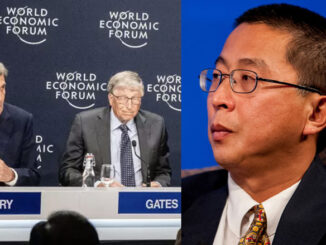
In 2021 the Guardian ran a series of adverts claiming the newspaper was “not funded by billionaires”, and “our readers’ backing gives us the independence to hold the powerful to account”. Not perhaps all the powerful. The Guardian is backed by a number of billionaire philanthropic foundations, including the European Climate Fund and the Rockefeller Family Fund. According to the investigative journalist Ben Pile, an additional $12 million grant from the Gates Foundation is equivalent alone to $116 for every reader of the print version.

This information is contained in a sensational and wide-ranging report from Pile that lifts the lid on the extraordinary influence a few wealthy individuals have recently gained in directing public policy across many political issues, including medicine, climate and Net Zero. Funding mainstream media plays a large part in driving public policy, and the amounts of money involved are staggering. So are the clouds of smoke produced to hide the scale of the subsidy. Pile notes that although the Guardian has run many articles denouncing the lack of transparency around the funding of Right-of-centre civil society organisations and the influence of ‘dark money’, neither the newspaper nor many of its backers detail their own funding relationships.
The Guardian is not the only mainstream media outlet in the U.K. to benefit from cash injections from Bill Gates. The BBC collects a handsome $58 million, while sizeable gifts have been pocketed by the Daily Telegraph and the Financial Times.

Climate-related grants between 2013-2021 by principal and strategic foundations are estimated to total $2.7 billion. This compares with an average 2018-2022 annual income for the Global Warming Policy Foundation, a critical climate and Net Zero think tank demonised by green activists, of $470,238. All this green largesse buys a lot of the useful smoke. The European Climate Fund, for instance, funds InfluenceMap which suggested in 2018 that the five largest oil companies spent $200 million a year on “narrative capture and lobbying on climate”. Earlier investigative work by Pile revealed that most of the claimed expenditure was based on speculation and estimation. Meanwhile, InfluenceMap’s own 11 funders were shown to have spent $1.2 billion on funding climate change campaigning and lobbying.
The latest Pile report is published by Together and Climate Debate U.K. and is titled ‘“Clean” Air, Dirty Money, Filthy Politics‘. It focuses on the “big bucks” behind the U.K. anti-car policies and air pollution panics. Its range is wide and the Daily Sceptic will report on some of the issues it raises in subsequent articles. But the main gist of its sensational findings is that a few ‘philanthropists’ now have “extraordinary influence” in global agencies such as the United Nations and the World Health Organisation, and their interest aligns academic research and non-governmental organisations of all kinds. In the process, they exclude the wider society and promote and often implement policies that have no grassroots support.
In London, Mayor Sadiq Khan chairs the C40 group of world mayors. Backed by billionaires such as Michael Bloomberg and Extinction Rebellion funder Sir Christopher Hohn, the group promotes a variety of lifestyle changes surrounding restriction of diet, travel and many other personal freedoms. It claims to represent “over 82 million people from diverse global contexts and around one fifth of the global economy”. Pile observes that it seems extremely unlikely that eight million Londoners have even heard of C40, let alone agree to its radical visions for the reorganisation of their lives.
Air pollution policies such as London’s Ultra Low Emissions Zone are said to be “proxy battles” of the climate war. Organisations involved in air pollution policies are wholly funded by climate change interests. “There are no grassroots air pollution campaigns of consequence,” states Pile. The public has been excluded from politics, he continues. Experts that depart from the policy agenda are routinely excluded from the public debate by research agendas, editorial policy and cancel culture. This deprives the public of debate about costs and trade-offs of far reaching policies. As an example it can be noted that the move to full Net Zero by 2050 was nodded through the British Parliament during the death throes of a May Government desperately seeking what was considered at the time as a virtuous legacy.
It is all possible because well-funded green organisations have worked to form a cross-party consensus. At the local level, continues Pile, air pollution policies have been imposed on populations without due democratic process. This of course has ended in London with a Labour Mayor punching down hard on car ownership among the less affluent members of society. Independent local organisations are “overwhelmed” by extremely well-funded and well-connected green organisations’ campaigns, he notes.
ENB Top News
ENB
Energy Dashboard
ENB Podcast
ENB Substack



